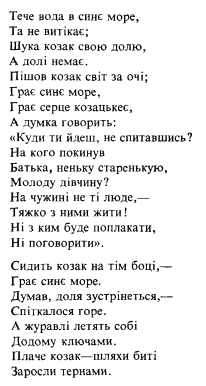Mova--tse dusha narodu (The language is the soul of the people). For Ukrainians, the proverb is indeed rooted in truth.
Centuries of subjugation and oppression by neighbouring conquerors and imperialists took their land and liberty but not their language which remains a strong symbol of Ukrainian national identity.
Since independence from the former Soviet Union in 1991, the language has experienced a revival and rebirth in Ukraine and was named the official language of the Ukrainian Republic after the declaration of statehood on August 24. The Union's policies of Russification repressed and restricted but did not destroy.
Ukrainian, together with Russian and Belarussian, belongs to the eastern group of the Slavic family of Indo-European languages.
Called the most ancient living Slavic language, it is said to the one most closely related to Old Church Slavic, the pre-modern literary language used by all Slavs.
Unique syntactic, morphological and phonological features characterize and separate it from the other East Slavic languages.
The Ukrainian alphabet is Cyrillic but differs slightly from the Russian and Belarussian languages which are also written in modified Cyrillic script.
The language is richly inflected, employing a system of seven cases (nominative, genitive, dative, accusative, vocative, instrumental, locative) in which nouns, adjectives and most pronouns decline in the singular and plural, marking the difference between animate and inanimate nouns with separate paradigms, and in three genders (masculine, feminine, neuter).
Verbs possess an "aspect" in which their use may be imperfective, for actions which are considered ongoing, or perfective, used to describe completed actions.
Accent in Ukrainian is unfixed and does not observe strict rules for its placement.
Word order is generally free owing to the system of inflections which keeps roles and
relationships defined. Ya mayu khyzhku. Mayu ya knyzhku. Knyzhku ya mayu. These are all grammatically correct ways in which to say "I have a book."
The spoken language is both musical and melodious with a rhythm and meter to its expression.
Today Ukrainian is used by approximately 45 million speakers in Ukraine and hundreds of thousands of immigrants and New World-decendents in numerous diaspora communities, most notably Canada, the United States, Brazil, Argentina and Australia, among others.
A unique development in the history of the Ukrainian language has been what socio-linguists and philologists have been calling the creation of new variants of Ukrainian in which the dominant language of the new environment (English in Canada or Portuguese in Brazil, for example) influences linguistically the transplanted mother tongue.
Strengthening and increasing the use and prestige of the Ukrainian language in Ukraine continues simultaneously with trends towards renewed and increased use and abilities of the ancestral language among Ukrainians abroad.
--Prepared by Jeffrey Picknicki Morski, University of Winnipeg


